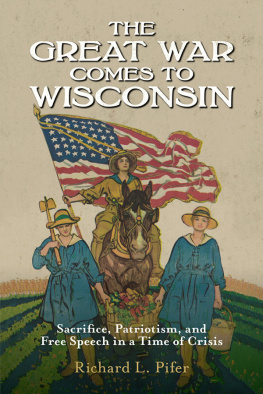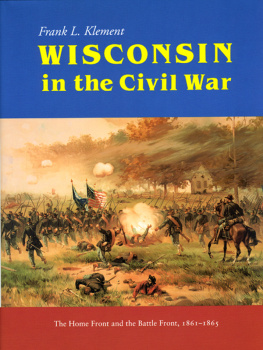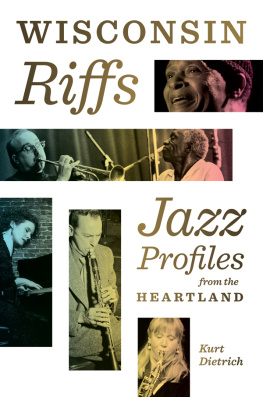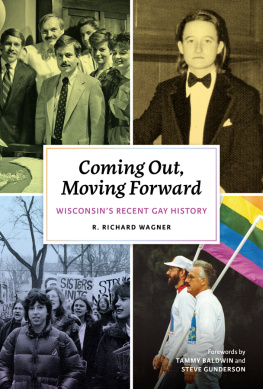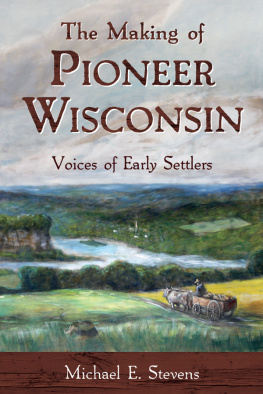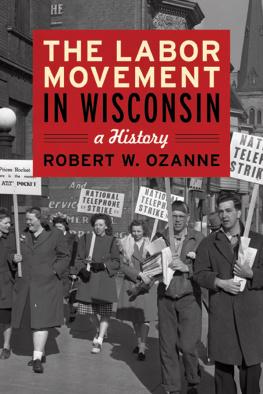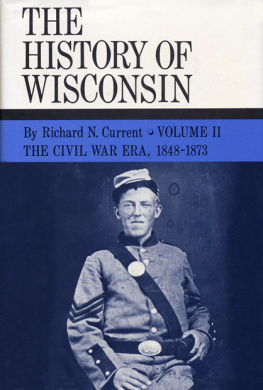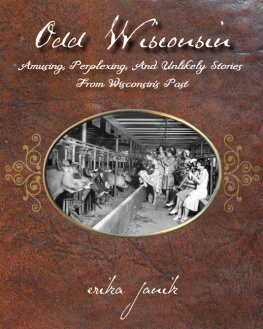THE GREAT WAR COMES TO WISCONSIN
Sacrifice, Patriotism, and Free Speech in a Time of Crisis
RICHARD L. PIFER
WITH MARJORIE HANNON PIFER
WISCONSIN HISTORICAL SOCIETY PRESS
Published by the Wisconsin Historical Society Press
Publishers since 1855
E-book edition 2017
The Wisconsin Historical Society helps people connect to the past by collecting, preserving, and sharing stories. Founded in 1846, the Society is one of the nations finest historical institutions.
Join the Wisconsin Historical Society: wisconsinhistory.org/membership
2017 by the State Historical Society of Wisconsin
For permission to reuse material from The Great War Comes to Wisconsin (ISBN 978-0-87020-782-2; e-book ISBN 978-0-87020-783-9), please access www.copyright.com or contact the Copyright Clearance Center, Inc. (CCC), 222 Rosewood Drive, Danvers, MA 01923, 978-750-8400. CCC is a not-for-profit organization that provides licenses and registration for a variety of users.
Photographs identified with WHi or WHS are from the Societys collections; address requests to reproduce these photos to the Visual Materials Archivist at the Wisconsin Historical Society, 816 State Street, Madison, WI 53706.
Front cover: World War I poster for the Womans Land Army, image from the Library of Congress, World War I Posters Collection
Cover design by Tom Heffron
Typesetting by Wendy Holdman Design
21 20 19 18 17 1 2 3 4 5
Library of Congress Cataloging-in-Publication Data
Names: Pifer, Richard L., 1950 author.
Title: The Great War comes to Wisconsin: sacrifice, patriotism, and free speech in a time of crisis / Richard L. Pifer.
Description: Madison, WI: Wisconsin Historical Society Press, 2017. |
Identifiers: LCCN 2017019397 (print) | LCCN 2017020123 (e-book) | ISBN 9780870207839 (E-book) | ISBN 9780870207822 (paperback)
Subjects: LCSH: World War, 19141918Wisconsin. | BISAC: HISTORY / Military / World War I. | HISTORY / Military / General.
Classification: LCC D570.85.W6 (e-book) | LCC D570.85.W6 P48 2017 (print) | DDC 940.3/775dc23
LC record available at https://lccn.loc.gov/2017019397
To Silas Wright Pifer,
Who survived the Great War,
And to his great-great-grandchildren,
Margaret, Amalia, and Silas,
May they never know war.
CONTENTS
T he Great War, the World War, the War to End All Wars, the War to Make the World Safe for Democracy. These are all names given to what Western observers at the time considered the most cataclysmic conflict in human historywhat we now call World War I. Whatever you called it, this war was like none before it.
World War I was the first of the total wars of the twentieth century, wars that were so large and demanded so many resources that, for all practical purposes, they engaged all of American society. Virtually everyone on the American home front, even children, participated in the war effort. They worked in war factories, volunteered for charities and on farms, conserved food and fuel, adhered to meatless and wheatless days, planted war gardens, bought Liberty Bonds, rolled bandages and knit sweaters for the Red Cross, and donated money to the YMCA. From all over the country, young men went to war. Wisconsin and Michigan National Guard regiments joined to form the 32nd Division and achieved a well-deserved reputation as an effective fighting force. Sacrifices were asked of and made by everyone in the name of winning the war.
This book endeavors to capture the essence of the home-front experience: the debates over the nations entry into the war, the patriotic fervor felt by most people once the war began, the worry experienced when loved ones went to fight over there, the political debates about war policy, and the impact of the wartime hysteria that drove most dissent underground. This is not a comprehensive history of the war or Wisconsins experiences during the war; that is beyond the scope of what could be accomplished in a book of this size. Rather, it illuminates the daily lives of people in Wisconsin during the war and, through that process, helps us better understand American society. The war brought out the best and the worst of human behavior. Day after day, average people worked hard and sacrificed in the name of the war effort, but one suspects motivations beyond simple patriotism. For the average American, winning the war was less about national priorities than about ending the conflict and bringing loved ones home safely.
In 1914, Wisconsins agricultural and industrial sectors were well positioned to support the war effort. Wisconsin led the nation in dairy production and had more cows than people. Not surprisingly, hay and forage dominated crop production, followed by oats, corn, barley, and potatoes, all of which became important substitutes for wheat during the war. Similarly, the skilled workers, machine shops, and heavy industry of Milwaukee were well equipped to produce the weapons of war.
This book focuses on the experiences of people in and from Wisconsin. That emphasis makes it possible to tell complex stories in context. The fabric woven out of these stories includes German Americans who loved the United States and their ancestral homeland; individuals who desperately wanted to avoid war and the small number who welcomed the defining challenge war presented; men who joined the Wisconsin National Guard and went to war to fulfill their patriotic duty; draftees who served faithfully because they had no choice; housewives whose careful management of household affairs became the linchpin of Herbert Hoovers Food Administration; people who bought Liberty Bonds and donated to the YMCA; farmers who grew crops to feed Europe; and industrialists who revamped entire factories so they could produce war supplies.
The final chapter includes the stories of six politicians, each one honorable in his own right, who interpreted duty and responsibility in different ways. Daniel Hoan, mayor of Milwaukee, and Emanuel Philipp, governor of Wisconsin, were practical politicians who believed they had a responsibility to govern for all the people. They were largely responsible for maintaining good order in the jurisdictions they governed. Robert La Follette, Wisconsins senior senator, and Victor Berger, editor of the Milwaukee Leader and a leading socialist, spoke out against the suppression of free speech and in favor of progressive war policies. In a climate of patriotic fervor and intolerance they paid a heavy price for their actions. Wheeler Bloodgood, a Milwaukee industrialist and founder of the Wisconsin Defense League, and Roy Wilcox, state senator and candidate for governor of Wisconsin, defined acceptable wartime behavior very narrowly and found enemies in anyone who disagreed with their view of the war. They suspected the states political leaders and many of its residents of being pro-German and unpatriotic.
Although most people willingly supported the war, they did so with clear knowledge of the social and legal penalties imposed on those who failed to do so.
The war demonstrated the frightening fragility of civil liberties. This was a time when neighbor informed on neighbor, when a wisecrack at a bar could get one tarred and feathered, when casting the smallest aspersion on wartime activities or policies could result in being jailed or fired. The Bureau of Investigation (precursor to the FBI), the Secret Service, and the US Marshals Service were all active in Wisconsin hunting for draft dodgers, German spies, and unpatriotic Americans.
Wisconsins reputation as the most German of states made it an easy target for super patriots. The states German Americans were loyal to the United States but had no desire to go to war against friends, relatives, and cultural kin of the fatherland. Likewise, Wisconsins large Scandinavian population had little desire to enter a conflict in which their homeland had no vested interests. The people of Wisconsin, indeed the nation, wanted to avoid the European carnage in 1914, but German submarine warfare eroded American neutrality and pushed the nation into the arms of the Allies. In Wisconsin, progressives, Germans, and Scandinavians remained steadfastly opposed to the war. When President Wilson called for a declaration of war, the Wisconsin congressional delegation voted the wishes of their constituents and overwhelmingly opposed entry into the war. Their opposition and the large German American population helped solidify the states undeserved reputation for traitorous behavior.

